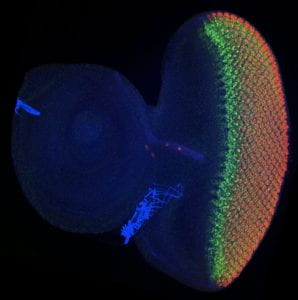As Science magazine’s Breakthrough-of-the-Year for 2018, single-cell RNA sequencing (scRNA-seq) technologies are transforming our understanding of cell and developmental biology. scRNA-seq promises to describe each cell in a tissue in terms of a state, defined as the global pattern of mRNA expression inside the cell. Major limitations are the difficulty in reconstructing the spatial position of each sequenced cell and using scRNA-seq to follow cell dynamics. The goal of this research position is to develop a radically new method to achieve accurate spatial and temporal mapping of scRNA-seq data. The method relies on physical principles to mathematically order the data onto a 2D lattice that simulates the tissue. In this case, the relevant tissue is the developing Drosophila retina, which provides a superbly tractable and well-defined model with which to address this problem. In particular, the stereotyped patterning and architecture of the retina facilitates the identification and tracking of individual cell types over space and time. Therefore, we have a rigorous “ground truth” to which to judge our method, refining it and modifying it to attain optimal and accurate mapping of scRNA-seq data onto spatial and temporal coordinates of a tissue.
data. The method relies on physical principles to mathematically order the data onto a 2D lattice that simulates the tissue. In this case, the relevant tissue is the developing Drosophila retina, which provides a superbly tractable and well-defined model with which to address this problem. In particular, the stereotyped patterning and architecture of the retina facilitates the identification and tracking of individual cell types over space and time. Therefore, we have a rigorous “ground truth” to which to judge our method, refining it and modifying it to attain optimal and accurate mapping of scRNA-seq data onto spatial and temporal coordinates of a tissue.
The project will involve an interdisciplinary collaboration between two Northwestern groups: Madhav Mani in the Department of Engineering Sciences and Applied Mathematics; Richard Carthew in the Department of Molecular Biosciences. The two groups have successfully been collaborating for five years, resulting in three papers thus far (Giri, 2020 eLife 9:e53638; Bakker, 2020 eLife 9:e56076; Alba, 2020 bioRxiv doi.org/10.1101/2020.10.13.333740), and more on the way. Mani and Carthew are also members of the NSF-Simons Center for Quantitative Biology. Dr. Carthew has studied retinal development for over 30 years (Hayashi, 2004 Nature 431, 647); Dr. Mani has pioneered new statistical methods for analyzing scRNA-seq data (Johnson, 2020 bioRxiv doi.org/ 10.1101/2020.11.18.389031).
Qualifications to fill this position include experience with next-generation sequencing and /or comparable molecular biology experience. A background in Drosophila or genetic research is not required. Some familiarity with computation of sequencing data is preferable.
Please submit a letter of interest, CV, and names/emails of three references to either: r-carthew@northwestern.edu madhav.mani@northwestern.edu


